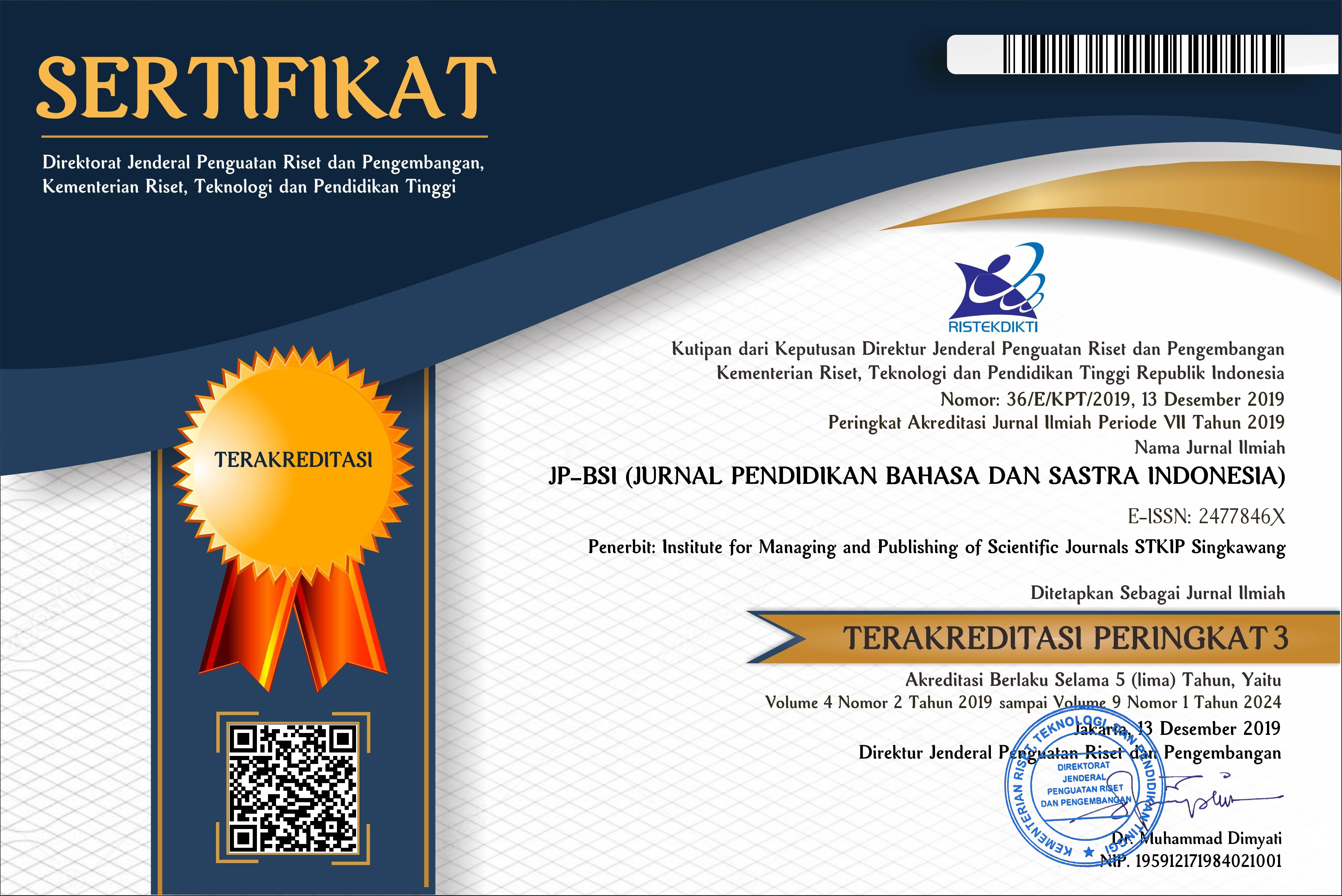Traditional theater Mendu of West Kalimantan as a Medium for Public Education
Abstract
Traditional theater has various functions in society, a part from being an entertainment also as an education media, an explication, communication, social integration, aesthetic expression, and artistic expression. Even in the early days of its appearrance, traditional theater mendu performances were precisely as a religious facilities. Therefore, it can be said that traditional performances are able to become archives for storing the noble values of local wisdom. This research aims to describe the function of the traditional theater mendu of West Kalimantan especially as an educational medium for the supporting community. This function could be in the form of scenes or dialogs during the show, either to the form of advices, religion advices, or inserted in jokes played by Khadam (Adam) and Mak Miskin from the common people. For the people of West Kalimantan, especially Mempawah district which is undergoing transition to modern society, the function of the performing arts should still be very dominant in influencing the community. Therefore, the traditional theater of mendu deserves to be maintained from the threat of extinction.
Keywords
Full Text:
PDFReferences
A. Halim R (ed). (2013). Mendu Teater Rakyat Kalimantan Barat. Manuskrif. Makalah tidak diterbitkan.
Achmad, A.K. (2006). Mengenal Teater Tradisional di Indonesia. Jakarta: Dewan Kesenian Jakarta.
Achmad, A.K., Ganda, Y., Rochyatmo, A., & Mujiono (ed). (Tanpa Tahun Terbit). Ungkapan Beberapa Bentuk Kesenian (Teater, Wayang dan Tari). Jakarta: Direktorat Kesenian, Proyek Pengembangan Kesenian Jakarta, Depertemen Pendidikan dan Kebudayaan Republik Indonesia.
Ahimsa-Putra, H.S. (2007). Ilmuwan, Budaya dan Revitalisasi Kearifan Lokal: Tantangan Teoritis dan Metodologis. Pidato Ilmiah Dies Natalis FIB UGM ke-62. Yogyakarta: Gajah Mada University Press.
Al-Ma’ruf, A.I. (2014) Pendidikan Multikultural Melalui Reaktualisasi Teater Tradisi Di Surakarta. Jurnal Manajemen Pendidikan. 9 (1), 1-14.
Arybowo. S. (2010). The performance of Panggung Bangsawan in Riau Lingga, A reconstruction of a theatrical process. Wacana. 12 (1), 20-34.
Asmoro, P., & Soetarno. (2005). Kehadiran Naskah Pedalangan Karya Tristuti Rahmadi di Suryasaputra dalam Pertunjukan Wayang Kulit Gaya Surakarta: Humanika.18 (3), 367-382.
Bin Hj. Abdullah, Z., & Bt. Dato’ Hj. Iskandar, S.A. (2017). Visual Dimension in the Performing of Makyung Raja Besar Ho Gading. International Journal of Academic Research in Economics and Management Sciences. 6 (4), 154-161.
Cresswell, J.W. (2015). Penelitian Qualitatif & Desain Riset. Memilih di antara Lima Pendekatan. Terj. Ahmad Lintang Lazuardi. Yogyakarta: Pustaka Pelajar.
Dimyati, I.S. (2010). Komunikasi Teater Indonesia. Bandung: Penerit Kelir.
González, A.A. (2011). National Theaters on the Iberian Peninsula: CLCWeb: Comparative Literature and Culture. 13 (5), 1-7.
Haba, J. (2007). Analisis SWOT Kearifan Lokal dalam Resolusi Konflik. Dalam Amirrachman, A. (ed). Revitalisasi Kearifan Lokal: Studi Resolusi Konflik di Kalimantan Barat, Maluku, dan Poso. (hlm. 324-338). Jakarta: International Center for Islam and Pluralism (ICIP).
Jaeni. (2019). Teater sebagai Media Komunikasi Pendidikan. Jurnal Aspikom. 3 (6):124-1139.
Juliastuty, D. (2014). Dinamika Teater Tradisional Mendu di Kalbar: Patanjala. 6 (1), 33-48.
Kaufman, A.S., & Kaufman, N.L. (2005). Essentials of Research Design and Methodology. USA: John Wiley and Sons Inc.
Leavy, P. (2017). Qualitative, Quantitative, Mixed Method, Art-Based, and Community Based, Participatory Research Approaches. New York: The Guilford Press.
Nalan, A.S. (2017). Dramawan dan Masyarakat. Yogyakarta: Penerbit Ombak.
Nazir, M. (2003). Metode Penelitian. Jakarta: Ghalia Indonesia.
Paluseri, D.D., Syahdenal, L.M., & Ryan. (2014). Warisan Budaya Takbenda Indonesia Penetapan Tahun 2014. Jakarta: Direktorat Internalisasi Nilai dan Diplomasi Budaya, Direktorat Jenderal Kebudayaan, Kementerian Pendidikan dan Kebudayaan Republik Indonesia.
Rais, W.A. (2017). Kajian Etnolinguistik: Kearifan Lokal dalam Bahasa dan Budaya Jawa. Pidato Pengukuhan Guru Besar Etnolinguistik Bidang Kearifan Lokal Fakultas Ilmu Budaya Universitas Sebelas Maret Surakarta.
Santosa. (2010). The effect of oral performances in audiences’ minds and behaviour. Wacana. 12 (1). 131-142.
Salvini, M. (1971). Performing Arts in Indonesia. Dalam Brondon, J. R. (eds) The Performing Arts in Asia. (hlm. 49-63). Paris: Unesco.
Sari, I.P., dan Juwati. (2019). Pengembangan bahan ajar cerita rakyat di SD Xaverius Lubuklinggau, BAHASTRA. 39 (1), 49-55.
Sedyawati, E. (2006). Budaya Indonesia, Kajian Arkeologi, Seni, dan Sejarah. Jakarta: Raja Grafindo Persada.
Sobuwaty, D. (2011). Mendu: Teater Rakyat Natuna. Marwah. VI (1), 4-14.
Taylor, R. (2007). Turning up the Volume: A Study of the Wan Smolbag Theatre Company. 3L Journal of Language Teaching, Linguistics and Literature. 13, 9-29.
Wardani, N.E., & Widiyastuti, E. (2013). Mapping Wayang Traditional Theatre as a Form of Local Wisdom of Surakarta Indonesia. Asian Journal of Social Sciences & Humanities. 2 (2), 314-321.
Wirawan, G., Waluyo, H.J., Suwandi, S., & Widodo, S.T. (2018). Mendu Traditional Theater as a Treasure of the Local Wisdom of West Kalimantan. Proceeding International Seminar On Recent Language, Literature, And Local Culture Studies (BASA). Advances in Social Science, Education and Humanities Research, volume 280. hlm. 98-103. Paris: Atlantis Press.
Vansina, J. (2014). Tradisi Lisan Sebagai Sejarah. Terj. Astrid Reza, dkk. Yogyakarta: Ombak. (Buku asli diterbitkan 1985).
Zed, M. (2008). Metode Penelitian Kepustakaan. Jakarta: Yayasan Obor Indonesia.
DOI: http://dx.doi.org/10.26737/jp-bsi.v5i1.1629
Refbacks
- There are currently no refbacks.
Published by:
Institute of Managing and Publishing of Scientific Journals STKIP Singkawang
e-ISSN: 2477-846X
p-ISSN: 2477-5932
Sekolah Tinggi Keguruan dan Ilmu Pendidikan (STKIP) Singkawang
Address : STKIP Singkawang, Jalan STKIP - Kelurahan Naram Singkawang, Kalimantan Barat, INDONESIA, 79251
No. Telp. : +62562 420 0344
No. Fax. : +62562 420 0342

Editor in Chief: [email protected] / Wa: +6281256252769
Coordinator: [email protected] / [email protected] / Wa: +6282142072788
Management Tools
JP-BSI Indexed by:
JP-BSI (Jurnal Pendidikan Bahasa dan Sastra Indonesia) is licensed under a Creative Commons Attribution-NonCommercial 4.0 International License.


















